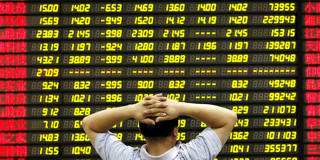It is time to stop viewing crises as exceptional events and admit how frequently shocks actually occur. The task of forecasters and policymakers is not to predict the next catastrophe but to sharpen their focus on resilience – what it takes to stay the course with politically mandated policies while minimizing the inevitable dislocations.
NEW HAVEN – I have been in the forecasting business for more than 50 years. Over that period, I have heard the constant refrain that the world is in the midst of “unprecedented changes.” This popular trope frequently resulted in equally hyperbolic corollaries: breathless claims that we have never faced greater risks or such an uncertain future, that forecasting has never been harder. Repeat it enough, and it starts to become believable.
Confession: my crystal ball has been cracked so many times by purportedly unprecedented developments that I have lost count. The 1970s was a decade of extraordinary turmoil: the oil shock of 1973 was swiftly followed by the “Great Inflation” and a period of stagflation, setting the stage for the first seemingly unprecedented phase of the post-World War II era. The subsequent disinflation of the 1980s allowed the horror movie of the 1970s to run in reverse well into the 1990s, which came to an end with the Asian financial crisis, ushering in what was initially billed as the first crisis of globalization.
But today, we look back on these episodes as mere tremors preceding the seismic shocks to come. The information-technology revolution and the dot-com bubble of the late 1990s and early 2000s hinted at the profusion of asset bubbles that afflicted global property markets and many financial instruments, from sub-prime mortgages to broader credit flows and equities. When the music stopped, the resulting cross-border and cross-instrument contagion fueled the global financial crisis of 2008-09 – another extraordinary upheaval for what had become, at that point, a crisis-battered world.

NEW HAVEN – I have been in the forecasting business for more than 50 years. Over that period, I have heard the constant refrain that the world is in the midst of “unprecedented changes.” This popular trope frequently resulted in equally hyperbolic corollaries: breathless claims that we have never faced greater risks or such an uncertain future, that forecasting has never been harder. Repeat it enough, and it starts to become believable.
Confession: my crystal ball has been cracked so many times by purportedly unprecedented developments that I have lost count. The 1970s was a decade of extraordinary turmoil: the oil shock of 1973 was swiftly followed by the “Great Inflation” and a period of stagflation, setting the stage for the first seemingly unprecedented phase of the post-World War II era. The subsequent disinflation of the 1980s allowed the horror movie of the 1970s to run in reverse well into the 1990s, which came to an end with the Asian financial crisis, ushering in what was initially billed as the first crisis of globalization.
But today, we look back on these episodes as mere tremors preceding the seismic shocks to come. The information-technology revolution and the dot-com bubble of the late 1990s and early 2000s hinted at the profusion of asset bubbles that afflicted global property markets and many financial instruments, from sub-prime mortgages to broader credit flows and equities. When the music stopped, the resulting cross-border and cross-instrument contagion fueled the global financial crisis of 2008-09 – another extraordinary upheaval for what had become, at that point, a crisis-battered world.